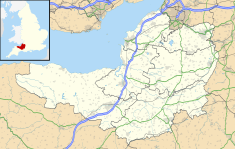The Anglican Church of St John in Cutcombe, Somerset, England was built in the 13th and 14th centuries. It is a Grade II* listed building.[1]
| Church of St John | |
|---|---|
 | |
| Type | Church |
| Location | Cutcombe, Somerset, England |
| Coordinates | 51°08′33″N 3°31′46″W / 51.1424°N 3.5295°W |
| Built | 13th century |
Listed Building – Grade II* | |
| Official name | Church of St John |
| Designated | 22 May 1969[1] |
| Reference no. | 1174575 |
History
editIt is likely there was a church on the site from the early 12th century when it belonged to Bruton Priory,[2] after previously falling within the remit of Glastonbury Abbey.[3]
The date of construction of the current building is not known, however the tower is from the 13th century while the north aisle is dated to the 13th or early 14th century. In 1713 part of the north aisle was rebuilt and the whole building given a Victorian restoration in 1862 by Charles Edmund Giles.[1][4]
The Rev. John Myers King was vicar here in the 19th century and he had a multi-lingual daughter, Alice King who was blind by the age of seven. She went on write a dozen novels and to lead bible classes and Sunday Schools for up to seventy men and boys.[5]
The organ was made by Henry Willis and brought to Cutcombe from the Methodist church in Hucknall, Nottinghamshire.[3]
Further restoration of the church was carried out after £150,000 was raised in 2001.[2]
The parish is part of the Exmoor benefice within the Diocese of Bath and Wells.[6]
Architecture
editThe stone building has a slate roof. It consists of a chancel, four-bay nave, three-bay north aisle, two-bay organ chamber, four-bay south aisle and a two-bay south chapel with a porch. The two-stage crenellated west tower is supported by diagonal buttresses.[1]
Inside the church is a font with a Norman base of Purbeck Marble with an Italian marble bowl.[1][7] The south aisle includes stained glass by Clayton and Bell.[1]
In the churchyard is the base of a 14th century cross,[8] which was restored in 1898 including the erection of an octagonal stone shaft and cross.[9]
See also
editReferences
edit- ^ a b c d e f "Church of St John". National Heritage List for England. Historic England. Retrieved 14 September 2017.
- ^ a b "St John's Church Cutcombe". Wheddon Cross. Retrieved 14 September 2017.
- ^ a b "A Brief History of the Church". St Johns Cutcombe. Archived from the original on 22 September 2017. Retrieved 14 September 2017.
- ^ Allen, N. V. (1974). Churches and Chapels of Exmoor. Exmoor Press. p. 49. ISBN 978-0900131165.
- ^ King, Alice (11 June 1887). "Our Blind Contributor written by herself" (PDF). Girl's Own Paper. pp. 1-. Retrieved 24 July 2022.
- ^ "St John the Evangelist, Cutcombe". A Church Near You. Church of England. Retrieved 14 September 2017.
- ^ "St John the Evangelist, Cutcombe, Somerset". The Corpus of Romanesque Sculpture in Britain and Ireland. King's College London. Retrieved 14 September 2017.
- ^ "MSO9208 - St John's Church and Churchyard, Cutcombe". Exmoor Historic Environment Record. Exmoor National Park. Retrieved 14 September 2017.
- ^ "Churchyard Cross about 3 metres south-east of porch, Church of St John". National heritage List for England. Historic England. Retrieved 14 September 2017.
